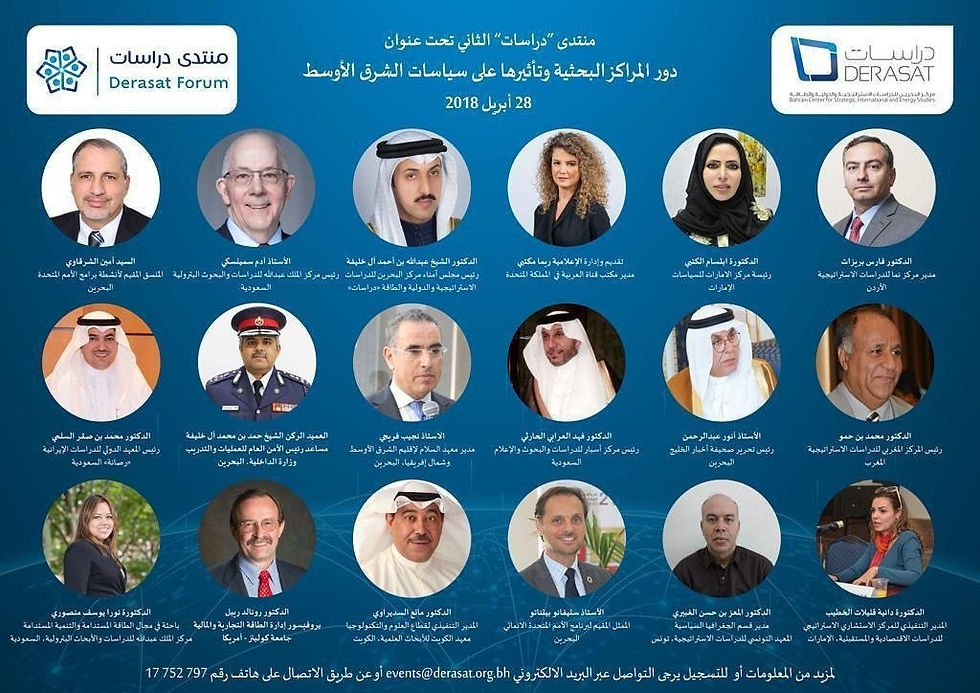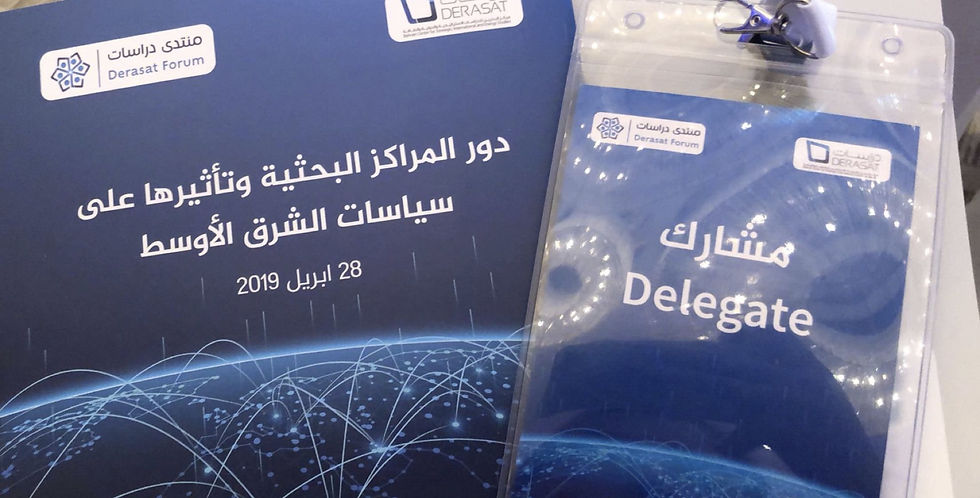Review: Think Tanks in the Kingdom of Bahrain
- AES

- Apr 28, 2019
- 3 min read
Updated: Jun 8, 2019
Opening with a bold statement of “The Kingdom of Bahrain is a more secure and safe country than many of the European states”, and “Bahrain is amongst the most secure countries in the world”, his Royal Highness Dr. Sheikh Hamad bin Mohammed Al Khalifa, the Assistant Chief of Public Security for Operations and Training Affairs in the MoI, has regarded the Bahriani society as a symbol of peace in the Middle East and the Arab region.
With the forum organized by DERASAT on the 28th of April 2019, the role of think tanks and its influence on Middle Eastern policy has been the topic of discussion. Hosting over a dozen speakers from across the Arab world to come together and voice their research, opinions and suggestions on the matter, DERASAT has done an excellent job of organizing a specified meeting point under the patronage of H.E. Dr. Sheikh Abdulla bin Ahmed Al Khalifa, the chairman of the Center for Strategic, international and Energy Studies. (DERASAT)

Throughout the talks with the honorable speakers that have joined in from different fields in politics, economics, energy, strategic studies, history, international policies, environmental studies, and out-of-the-kingdom Think Tanks, they have all signified the importance of local Bahraini Think Tanks for the kingdom and have encouraged them across the Arab region with bonds and cooperation between them, with its most crucial role of influencing Middle Eastern Policies. They have touched upon how these Think Tanks are currently almost inexistent and not given much importance to, with most of the local cases going to Think Tanks abroad for analysis and solutions.
The most repeated phrases throughout the conference have been the following:
With the progress currently in the Kingdom of Bahrain, imagine how much further local Think Tanks could take us. How can we minimize our dependence on western influence on our policies and our Think Tanks? How can we as Arab countries, and specifically as the Kingdom of Bahrain create an environment of cooperation, trust, and idea flows between our local Think Tanks and our governments and those in charge of policy making? How can we enable for these Think Tanks to become and remain a strategic partner to these organizations as seen in the west?

The answer has taken many forms, with each of the speakers weighing in with their pivotal ideas and respected experiences. However, most points mentioned all revolved around the following ideas:
To first and foremost limit our dependence on the west, both monetarily and in means of strategic decision-making and action. We, as the Arab world, are capable of providing for ourselves and must find the balance of our codependence. Secondly, we need to bring out local mental resources and capabilities and encourage local Arab ideas, and make sure there is a direct link between what we gather and those in charge of policy making, as well as local unbiased media. We need to close the gaps currently present between the three. Lastly, to focus on how Think Tanks in the Middle East specifically are able to implement the ideas that arise within them in fruitfully aiding local economic plans, combatting terrorism and extremism in the region, besides helping in achieving the United Nations’ Global Sustainable Development Goals before the year 2030.
Think Tanks play a major role within any society, and the communities and countries already implementing them are ahead in policy making and are in the process of further democratization by taking in the view of the public. This is exactly what Bahrain is working towards with forums and discussion boards such as the one organized by DERASAT, and this is a big and crucial step for the Bahriani society.
Written by: A.E.S.
April, 2019.





Comments